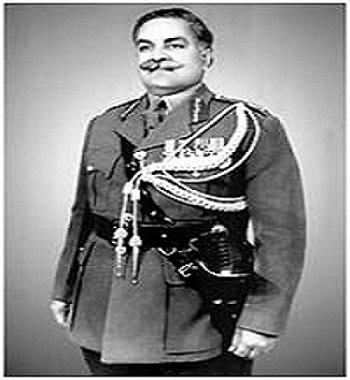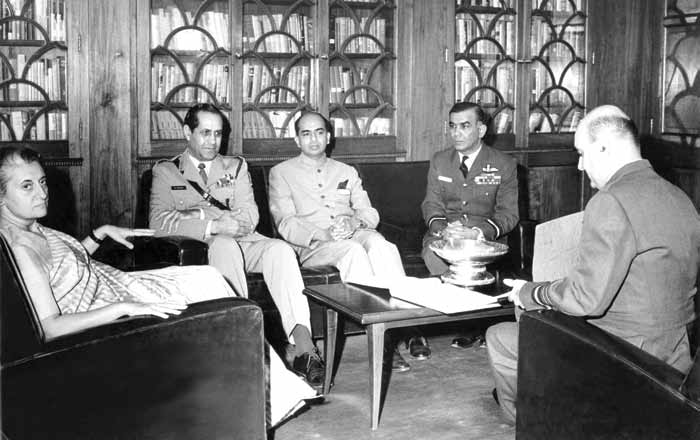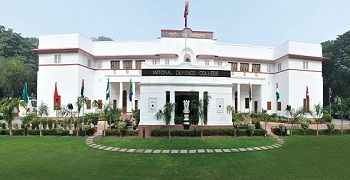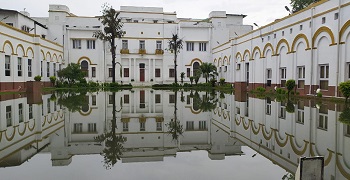The National Defence College (NDC) located at New Delhi, is India’s apex institution of learning for the study and practice of National Security and Strategy. Established in 1960 it has over the years earned a reputation for excellence and gained world renown. It is dedicated to the intellectual development and strategic enculturation of selected senior officers of the armed forces and civilian government services of India and those from foreign countries, for higher leadership positions and responsibilities.
In July 1958, the Ministry of Defence accepted the need for broad-based training within the country, for senior decision-makers, on matters related to national security and strategy. They recognised that such training would be more useful if it encompassed not only defence matters but various diverse subjects related to national security. The Parliament Estimates Committee established the feasibility of setting up an institution for imparting such training in India, on the pattern existing in other countries with advanced military capabilities.

On May 6th, 1959, the Cabinet Defence Committee approved the proposal for establishing the National Defence College. On September 15, 1959, the Defence Minister issued formal orders, conveying the sanction of the President of India for setting up a National Defence College (NDC) in India for preparing senior service and civil officers for assuming higher responsibilities in the planning and management of national security and strategy.
In July 1959, Lt General K Bahadur Singh was appointed the first Commandant of the College. By the end of the year, he formulated detailed plans including the aim and the charter of NDC as well as the scope of studies at the College. The Chiefs' of Staff approved them on December 25, 1959.



On April 14, 1960, the Ministry of Defence, laid down the following aim for the College:-
The NDC will provide joint training and instruction to senior service and civil officers and will be under the administrative control of the Ministry of Defence. The study at the College will relate to strategic, economic, scientific, political and industrial aspects of national defence.
Based on the aim, the scope of the study was planned to include an examination of internal and external threats to the security of India as well as possible trends for the next ten years. Studies would include analysis of diverse factors such as foreign policies of other nations, conflicts over vital economic interests or territorial claims and factional, communal or political differences. Members of the course would also analyse the formulation of a national strategy for various contingencies up to and including the outbreak of war. Based on these guidelines, the first Course at NDC commenced on April 27, 1960.
The National Defence College was organised on the pattern of the Imperial Defence College (now Royal College of Defence Studies) of the U.K. with its location in New Delhi.
The historic occasion was fixed for 10.00 AM on Wednesday, the 27, April 1960. The Prime Minister, while inaugurating the College gave his famous quote which formed the Motto for the College. Keeping in the background situation and security environment, prevailing at that time, he outlined the importance of broader defence strategy. He stressed this to meet new dangers of a 'continuing nature' on India's frontiers. He said:
"We desire to live peacefully and co-operate with all neighbours. Nevertheless, no defence apparatus could live in a pure idealistic way. It has to be very realistic and remain prepared for any emergency".
The Prime Minister emphasised the need for an effective coordination between defence services and other aspects of the country's economic, industrial and administrative life, including the country's foreign policy.
He said, 'The organisation of this institution had become a positive necessity to meet the defence problems as they were likely to be in future. India had to face these problems continuously for a considerable period'. He further added that the National Defence College had to develop a broader outlook and understanding, out of which would grow a broader strategy. The defence itself is not an isolated matter now. It is intimately connected with the economic aspect, industrial aspect and many other aspects in the country.
The Hon'ble Prime Minister concluded his speech by saying, 'I have no doubt that the officers, defence or civil, who come here, will profit by their stay and then be able to improve others who come in contact with them in the positions they may be serving'. And, I agree that this College should have contact with the Civil Services and people from Civil Services should come here, not only to develop these contacts but it is necessary for them to know the problems in this wider field. So I am glad to be here to give a slight push, this morning, to this National Defence College and I believe I am supposed to say the formal words, 'I inaugurate it with pleasure'.
The glittering ceremony on that august Wednesday morning was attended by a small but distinguished gathering which included Defence Minister Mr. V K Krishna Menon, the three Service Chiefs, the Commonwealth and Foreign Secretaries, the British High Commissioner and prominent MPs. Others present were the Commandant, the Senior Directing Staff, namely, Shri BN Varma, ICS, Rear Admiral A Chakravarti and Air Vice Marshal R Raja Ram, DFC, and the chosen 21 Course Members who were there to embark upon the historic First Course.

The first Course started on 27 April, I960. The curriculum included a study of internal threats affecting national security. The internal threats included economic, social and political aspects. The curriculum incorporated a study of external, economic and defence policies of world powers namely, the USA, erstwhile USSR and China followed by a similar study of policies of neighbouring countries, which could impact the national security, due to their own or world power policies. The last two studies were of the world war and, with this overall background, to recommend strategic policies in diplomacy, economy and defence. This basis proved to be very sound as the studies in the first two Courses forecasted correctly the war with China in the winter of 1962 and with Pakistan before 1966.

The Crest of the college approved by the President of India on 24 May 1965, was designed to integrate the significance of the three services of Defence and the Civil Service. The crest is made up of a lamp, with flames that represent the Army, the Navy, The Airforce and the Civil Services. The National Emblem is at the top of the Lamp is surrounded by evergreen Leaves of Ashok Tree with the College Motto inscribed at the base of the Lamp. The Motto 'Buddhiryasya Balamtasya' in Sanskrit has been taken from Hitopadesha or the Book of Amicable Instruction and means 'Wisdom is Strength'. At the base is a scroll in yellow parchment bearing the name of the College.


The NDC is housed in Bungalow No 6, Tees January Marg (Previously known as Albuquerque road belonged to Khan Saheb Tej Muhammad Khan of Badarshi, Naushera in NWFP. He had built this mansion in 1935 for his comfort and to entertain his business associates and friends. The house was majestically built on Victorian Architecture with Viceregal splendor.
The British Government acquired this bungalow in 1939 and used it as a General Mess for the Army. In 1945, after the war, it was occupied by the Army and run by the Army Training School as a hostel for Army Officers. By September 1946, the British Government had decided to use this building as a part of the establishment of the British High Commission.
On 25th Sep 1959, the Ministry of Defence acquired this bungalow for NDC. By the end of March 1960, the bungalow was taken over and after renovation, the College was inaugurated in this building on 27 April 1960. The building, as we know after 61 years of initial take over, has undergone repairs and renovations regularly to meet the requirements of the College.

| Service | Stats |
|---|---|
| Indian Army | 1445 (36%) |
| Indian Navy | 301 (7%) |
| Indian Air force | 581 (15%) |
| Indian Civil Services, PSU | 875 (20%) |
| Foreign Officers | 797 (22%) |
The foreign students started attending the Course at NDC from the Second NDC Course onwards and their number has been steadily increasing. So far, 70 countries have represented on the NDC Courses.
A University Division was established in the college in 2006. NDC is affiliated to the Madras University. Several officers undergoing the prestigious National Defence and Strategic Studies Course have undertaken. while doing the course Since 2023, NDC has entered into an MoU with IIT Madras for executive MBA. Currently all Course Participants of NDC undertaken this executive MBA Programme from IIT Madras. A Research Wing has also been created in 1999 to carry out policy-related research of strategic importance by research fellows.